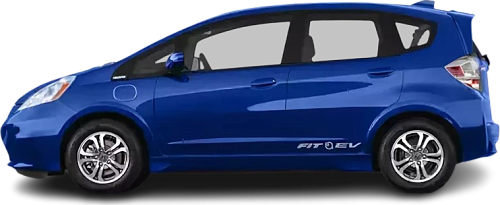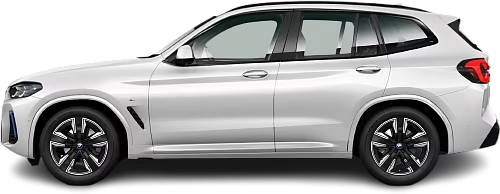USA EV Comparison: Honda Fit EV Gen 1 vs BMW iX3 Gen 1
Struggling to Decide? Let AI Help!
Your AI Summary Is Ready!
General Info
Since both vehicles have been discontinued, they are now only available on the used car market. You can get the Honda Fit EV (2013-2015) for as low as $4100, while the BMW iX3 Gen 1 (2020-2021) was never offered for sale in the United States.
The Honda Fit EV (2013-2015) is a Hatchback, whereas the BMW iX3 Gen 1 (2020-2021) is a SUV.
| Property | Honda Fit EV Gen 1 | BMW iX3 Gen 1 |
|---|---|---|
| Years of Production | 2013-2015 | 2020-2021 |
| Current Status | Discontinued | Discontinued |
| Country of Manufacture | USA | China |
| Body Style | Hatchback | SUV |
| Market Availability | USA | EU |
| Price USA (Used) | $4100 | - Price USA (Used) |
| GCC Score | 3.9 | 6.5 |
Range and Efficiency
While the BMW iX3 Gen 1 (2020-2021) offers a longer real-world range and a bigger battery, it is less energy-efficient than the Honda Fit EV (2013-2015).
| Property | Honda Fit EV Gen 1 | BMW iX3 Gen 1 |
|---|---|---|
| Range (EPA) | 82 mi | - Range (EPA) |
| Range (WLTP) | - Range (WLTP) | 286 mi |
| Range (GCC) | 78 mi | 243 mi |
| Battery Capacity (Nominal) | 20 kWh | 80 kWh |
| Battery Capacity (Usable) | 19 kWh | 74 kWh |
| Efficiency per 100 mi | 24.4 kWh/100 mi | 30.5 kWh/100 mi |
| Efficiency per kWh | 4.11 mi/kWh | 3.28 mi/kWh |
| Range and Efficiency Score | 5.4 | 6.4 |
Charging
Both vehicles utilize a standard 400-volt architecture.
The Honda Fit EV (2013-2015) has no DC fast charging capability, whereas the BMW iX3 Gen 1 (2020-2021) can charge at up to 155 kW.
The BMW iX3 Gen 1 (2020-2021) features a more powerful on-board charger, supporting a maximum AC charging power of 11 kW, whereas the Honda Fit EV (2013-2015) is limited to 6.6 kW.
| Property | Honda Fit EV Gen 1 | BMW iX3 Gen 1 |
|---|---|---|
| Max Charging Power (AC) | 6.6 kW | 11 kW |
| Max Charging Power (DC) | - Max Charging Power (DC) | 155 kW |
| Architecture | 400 V | 400 V |
| Charge Port | Type 1 (J1772) | CCS Type 2 |
| Charging Score | 2.7 | 6.5 |
Performance
The BMW iX3 Gen 1 (2020-2021) is rear-wheel drive, while the Honda Fit EV (2013-2015) offers a front-wheel drive system.
The BMW iX3 Gen 1 (2020-2021) boasts greater motor power and accelerates faster from 0 to 60 mph.
| Property | Honda Fit EV Gen 1 | BMW iX3 Gen 1 |
|---|---|---|
| Drive Type | FWD | RWD |
| Motor Type | PMSM | PMSM |
| Motor Power (kW) | 92 kW | 210 kW |
| Motor Power (hp) | 123 hp | 282 hp |
| Motor Torque | 189 lb-ft | 295 lb-ft |
| 0-60 mph | 8.1 s | 6.5 s |
| Top Speed | 90 mph | 112 mph |
| Performance Score | 2.7 | 4.4 |
Dimensions
The BMW iX3 Gen 1 (2020-2021) boasts a more extended wheelbase.
| Property | Honda Fit EV Gen 1 | BMW iX3 Gen 1 |
|---|---|---|
| Length | 161.6 in | 186.4 in |
| Width (with Mirrors) | 66.7 in | 84.2 in |
| Width (w/o Mirrors) | - Width (w/o Mirrors) | 74.4 in |
| Height | 60 in | 65.7 in |
| Wheelbase | 98.4 in | 112.8 in |
Cargo and Towing
Neither car is equipped with a frunk (front trunk).
Neither vehicle is officially rated for towing in the US.
| Property | Honda Fit EV Gen 1 | BMW iX3 Gen 1 |
|---|---|---|
| Number of Seats | 5 | 5 |
| Curb Weight | 3252 lb | 4982 lb |
| Cargo Volume (Trunk) | 12 ft3 | 18 ft3 |
| Cargo Volume (Max) | - Cargo Volume (Max) | 55.1 ft3 |
| Cargo Volume (Frunk) | - Cargo Volume (Frunk) | - Cargo Volume (Frunk) |
| Towing Capacity | - Towing Capacity | - Towing Capacity |
| Cargo and Towing Score | 4 | 7.3 |




